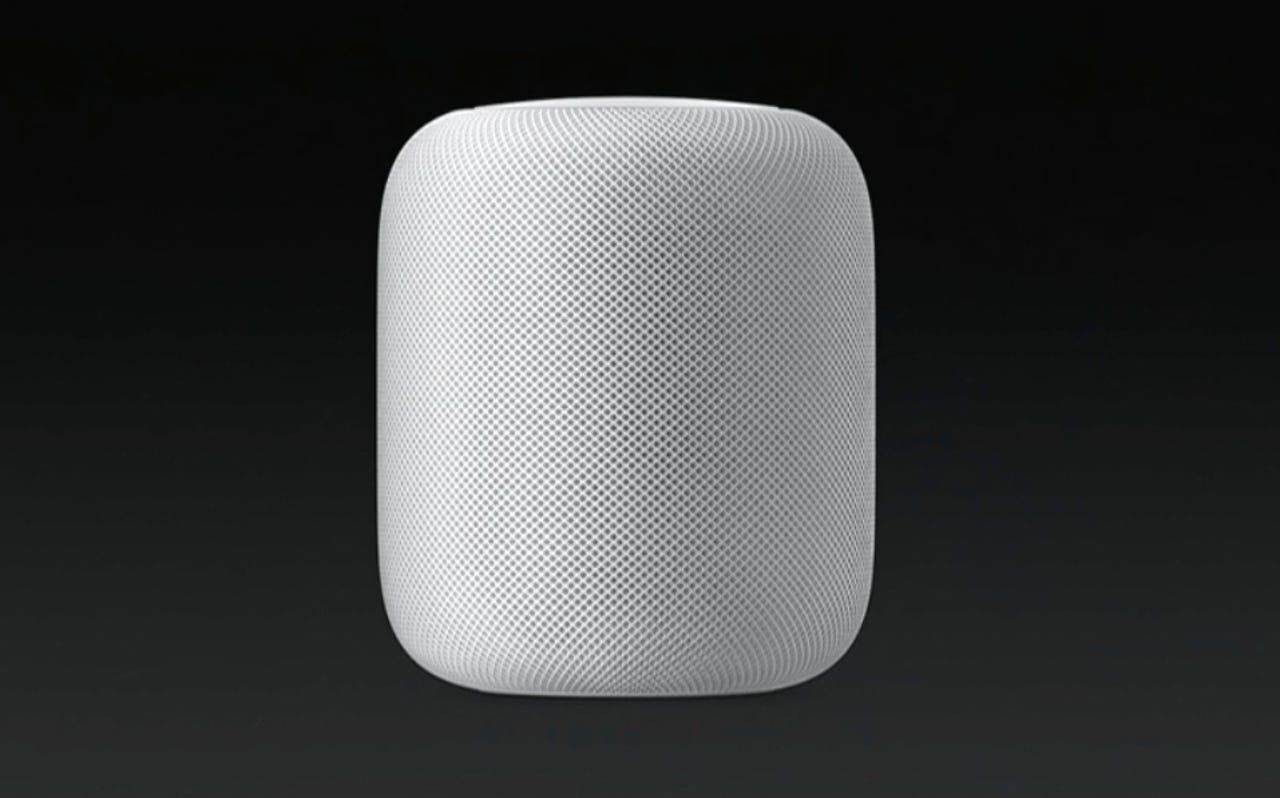Apple reveals HomePod, a privacy-focused smart assistant


(Image: Apple)
Apple has revealed its latest invention, the HomePod. It's a new Siri-powered smart assistant that Apple says will "reinvent home music."
The smart assistant was revealed Monday at the company's Worldwide Developer Conference (WWDC) in San Jose, Calif., in an effort to lure in developers to work on the next-generation platform.
Apple's marketing chief, Phil Schiller, said on stage during the keynote that the speaker is powered by Siri intelligence, which he said had seen significant improvements and enhancements since its debut. It can interact with your messages, relay sports scores, the news, general knowledge, provide translations, and control your home.
The speaker comes with a seven-array, beam-forming tweeter, with directional control, and a bass woofer -- and it's powered by an A8 chip, which Schiller said may be the "biggest brain in a speaker."
"It sounds incredible," said Schiller, during the keynote.
It also uses spacial awareness to adapt and ensure a better sound, depending on its environment, and it works closely with Apple Music.
Siri will now share its learned and personalized data across devices with end-to-end encryption -- so that Apple doesn't know your preferences.
Siri, the company's almost-forgotten, voice-activated assistant, has long been outdone and eclipsed by Amazon and Google's hardware assistants. Apple's betting on its artificial intelligence effort, with a helping hand from developers, to help Siri one-up and leapfrog its competitors.
The timing isn't all that surprising. The smart assistant market is anything but crowded, but it already has two well-established players in the space. Both Amazon's Echo and Google's Home have taken the markets by storm, but they have long been dogged with privacy concerns about who has access to users' spoken data and search queries. Amazon and Google are invested in selling your data for more targeted advertising, which subsidizes the lower price of its devices. Apple, on the other hand, is focused on selling hardware and apps.
That's held the company in good stead in recent years. Locking itself out of the data loop means it can't turn over much of your data to the government. Compare that to Amazon, which has -- to date -- refused to turn over any figures on government requests the retail giant may have received.
Some already think Google's plan for its cloud-based artificial intelligence assistant is a "privacy nightmare," because its users are effectively giving up their data so Google can sell it and monetize it.
Apple's logic is that, for the most part, it doesn't want your data. Federighi reiterated that many of the advanced deep learning and artificial intelligence analysis -- such as finding your location, facial recognition in photos, and setting calendar reminders -- is done on the device, shutting Apple out of the loop -- preventing anyone from asking Apple for data it doesn't have.
But for a company that doesn't want your data -- to make Siri better, it has increasingly been asking for it. Apple contends that it still doesn't want to see your information.
Starting in iOS 10, released last year, the software built in a safeguarding engine, dubbed "differential privacy," that effectively scrubs and adds noise to user data so that the company can't tell where it's coming from but can still provide useful feedback to the user. That means Apple can analyze search queries for trends, without being able to identify any particular individual customer.
In effect, it can use this mass of crowdsources data to spot trends that lets the company return common, trending queries back to users faster without compromising privacy, it says. Or, in other words, "differential privacy addresses the paradox of learning nothing about an individual while learning useful information about a population," said Aaron Roth, an associate professor at the University of Pennsylvania and an expert on differential privacy.
Apple seems to hope this approach can let it compete in an already established space with a novel twist to stand out from the crowd -- privacy -- where the alternative is open season on your private information.
HomePod will be available in December for $349.